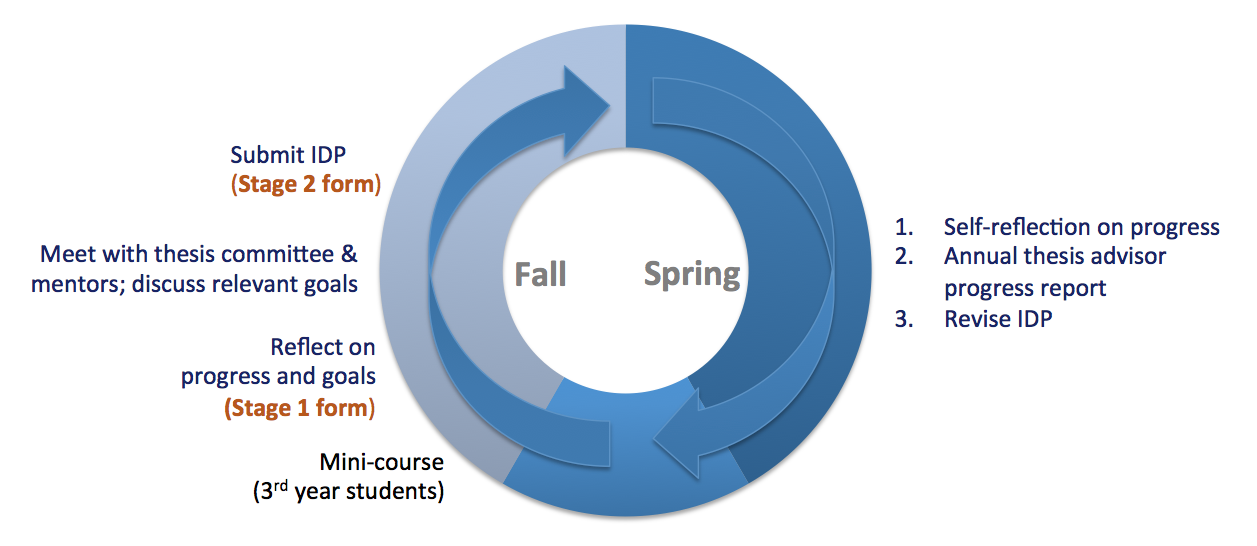IDP Process for Morningside Graduate School of Biomedical Sciences Students
All PhD students at or above their third year of training (i.e., enrolled in BBS865) are required to create and submit an IDP in the Fall semester annually until graduation. This will be tracked through BBS865 using Canvas.
The process outlined below was designed to make creating an IDP a meaningful, beneficial experience for you. The cycle was timed to complement the annual Morningside Graduate School of Biomedical Sciences advising cycle. The advising cycle below assumes that you meet with your Thesis Research Advisory Committee (TRAC) in the Fall semester.

Fall
- IDP Stage 1: Self-reflection in preparation for meetings with mentors. Form GSBS67 is due by the date of your TRAC meeting. Download the form from Blackboard Learn. View a student sample of a completed Stage 1 form. The first step toward creating an IDP is to reflect on your progress over the past year, big-picture goals for the coming year, and resources you will need to achieve those goals. Doing so will help you identify what you need (or want) to discuss with mentors--your research advisory, TRAC, and other career-related mentors. The goals you outline at this stage will also act as a preliminary framework for the action plan you lay out in Stage 2 of your IDP.
- Seek input and advice from mentors. How much of your IDP you discuss with others is up to your discretion. You will be discussing your research-related goals in your annual TRAC meeting and with your thesis advisor. Their knowledge of your skills and interests may also help them provide invaluable career-specific advice. In addition, it is wise to seek out career-related advice from an additional scientist intimately familiar with your career of interest.
- IDP Stage 2: Refine your IDP. Form GSBS68 is due within one month following your TRAC meeting. Download the form from Blackboard Learn. View a student sample of a completed Stage 2 form. The purpose of this step is to lay out and report your action plan for the year--that is, the actions you will take in order to achieve your desired goals. Form GSBS68 provides specific guidelines for this.
Spring
4. Your thesis advisor is required to submit an evaluation of your progress and development in the Spring semester. This is an opportune time to schedule a meeting with your thesis advisor to receive feedback and discuss upcoming goals. To prepare for this meeting, do a self-reflection step similar to that described above for Stage 1. This is a recommended step; you do not need to submit any assignment.
Students repeat this process every year until completion of the Ph.D.
FAQ:
I don’t know what career path I want to follow. How can I figure this out?
Do some self-reflection and research to learn about career options for scientists. myIDP is a good place to start; you will also find helpful resources in the Career Pathways section of this website. You can go ahead and craft goals for the coming year, including specific goals for helping you learn about career options and focus your career interests.
How do I turn in the IDP Stage 1 and Stage 2 forms?
Instructions for how to submit your Stage 1 and Stage 2 forms are provided within the BBS865 course in Blackboard Learn. If you have any questions, please contact us.
Who will see my IDP Stage 1 and Stage 2 forms?
Only select members of the cBCD will have access to content submitted through the IDP Portal. Note that no PI’s of research labs or other members of Morningside Graduate School of Biomedical Sciences leadership will have access. Instead, we want to encourage you to develop your own strategy for using your IDP in discussions with your research advisor and other mentors.
How will my IDP be assessed?
Your IDP is your own document; therefore, there is no “right” or “wrong” answer. However, we will follow up with you if your thought process behind the plan is not evident to us via the Stage 1 and Stage 2 forms, or to request an explanation if you have not included goals related to your development (that is, skills development or career-related goals). Each IDP is also read to ensure standard structural expectations are met (for example, each action or goal in your plan must have a time period or deadline associated with it). Note: cBCD staff will not provide professional development advice to you based on what is submitted via this assignment. To discuss any issues related to your career or professional development, please schedule a confidential appointment.
Should I discuss my IDP with my thesis advisor or other mentors?
Yes, you should have discussions with your thesis advisor, TRAC, and other mentors as you develop this year's plan, and as you progress toward your goals. Read this article for suggestions on how to prepare for and frame these discussions. Note that you are not required to discuss any particular aspects of your IDP with mentors. Planning and self-advocacy related to your professional development and career advancement are your responsibility, and you should seek advice from mentors in a way that will best meet your needs.
I would like to discuss my IDP with cBCD staff. How can I schedule an appointment?
The cBCD staff is happy to meet with you to discuss anything related to the IDP process. We can brainstorm with you about setting SMART goals for what you want to achieve, identifying relevant resources, finding or approaching mentors, assessing whether your plan is realistic, or time management strategies to help you reach your goals. Set up a confidential appointment.
Questions? Contact us.



